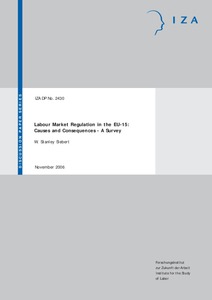Labour market regulation in the EU-15: causes and consequences - a survey
"Why should floors be set under wages and working conditions by labour market regulations? This paper finds that efficiency arguments are questionable, because of the disemployment effects of strict regulation. Regulation is better explained in terms of the choices of the employed semi- and uns...
| Main Author: | |
|---|---|
| Institution: | ETUI-European Trade Union Institute |
| Format: | TEXT |
| Language: | English |
| Published: |
Bonn
2006
IZA |
| Subjects: | |
| Online Access: | https://www.labourline.org/KENTIKA-19293954124910111369-Labour-market-regulation-in-th.htm |
| Summary: | "Why should floors be set under wages and working conditions by labour market regulations? This paper finds that efficiency arguments are questionable, because of the disemployment effects of strict regulation. Regulation is better explained in terms of the choices of the employed semi- and unskilled worker group. This group contains the median voter, who rationally desires strict regulation to divert rent from other groups such as the skilled workers and the unemployed. Legal origin may also be important: some countries have fallen under the influence of the interventionist French (or German) legal tradition. Given a predisposition to intervene, these countries begin with some degree of labour regulation, which then creates its own constituency of rent protectors and rent growers." |
|---|---|
| Physical Description: | 24 p. Digital |

